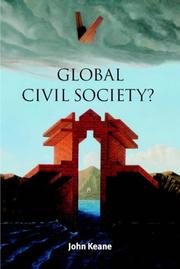| Listing 1 - 10 of 89 | << page >> |
Sort by
|
Book
ISBN: 9781107614574 9781107041776 9781107300767 Year: 2013 Publisher: Cambridge Cambridge University Press
Abstract | Keywords | Export | Availability | Bookmark
 Loading...
Loading...Choose an application
- Reference Manager
- EndNote
- RefWorks (Direct export to RefWorks)
Political systems --- Mass communications --- Communication, International --- Mass media and globalization. --- Information technology --- Political participation --- Democracy. --- Communication internationale --- Médias et mondialisation --- Technologie de l'information --- Participation politique --- Démocratie --- Social aspects --- Political aspects --- Political aspects. --- Technological innovations. --- Aspect social --- Aspect politique --- Innovations --- Médias et mondialisation --- Démocratie
Book
ISBN: 0521255430 Year: 1984 Publisher: Cambridge New York Sydney Cambridge University Press
Abstract | Keywords | Export | Availability | Bookmark
 Loading...
Loading...Choose an application
- Reference Manager
- EndNote
- RefWorks (Direct export to RefWorks)
Economic sociology --- Political sociology --- Bureaucracy. --- Democracy. --- Socialism. --- Socialisme / et démocratie. --- Socialisme / en democratie.

ISBN: 0745608043 Year: 1991 Publisher: Cambridge Polity
Abstract | Keywords | Export | Availability | Bookmark
 Loading...
Loading...Choose an application
- Reference Manager
- EndNote
- RefWorks (Direct export to RefWorks)
Political systems --- Mass communications --- 316.774.16 --- 32.019.51 --- #SBIB:309H1015 --- #SBIB:324H30 --- #SBIB:031.GIFTCOM --- Massamedia: maatschappelijk, politiek, ideologisch, ethisch, juridisch, socio-cultureel--(communicatiesociologie) --- Massacommunicatie. Opinievorming. Politieke beinvloeding. Politieke manipulatie. Propaganda --- Media: politieke, juridische, ethische, ideologische aspecten (incl. privacy) --- Politieke cultuur --- 32.019.51 Massacommunicatie. Opinievorming. Politieke beinvloeding. Politieke manipulatie. Propaganda --- 316.774.16 Massamedia: maatschappelijk, politiek, ideologisch, ethisch, juridisch, socio-cultureel--(communicatiesociologie) --- Information, Théorie de l'

ISBN: 0521836999 0521545447 1107150264 0511214383 0511216173 0511315074 051175602X 1280515864 0511210809 0511212577 9780521836999 9780521545440 9780511214387 9780511216176 9780511756023 9780511210808 9780511212574 9781107150263 9781280515866 9780511315077 Year: 2004 Volume: *4 Publisher: Cambridge Cambridge University Press
Abstract | Keywords | Export | Availability | Bookmark
 Loading...
Loading...Choose an application
- Reference Manager
- EndNote
- RefWorks (Direct export to RefWorks)
In this provocative book, first published in 2004, John Keane calls for a fresh understanding of the vexed relationship between democracy and violence. Taking issue with the common sense view that 'human nature' is violent, Keane shows why mature democracies do not wage war upon each other, and why they are unusually sensitive to violence. He argues that we need to think more discriminatingly about the origins of violence, its consequences, its uses and remedies. He probes the disputed meanings of the term violence, and asks why violence is the greatest enemy of democracy, and why today's global 'triangle of violence' is tempting politicians to invoke undemocratic emergency powers. Throughout, Keane gives prominence to ethical questions, such as the circumstances in which violence can be justified, and argues that violent behaviour and means of violence can and should be 'democratised' - made publicly accountable to others, so encouraging efforts to erase surplus violence from the world.
Democracy --- Democratie --- Démocratie --- Geweld --- Inspraak in het beleid --- Overlegcultuur --- Self-government --- Violence --- 811 Filosofie --- Democracy. --- Violence. --- Violent behavior --- Social psychology --- Political science --- Equality --- Representative government and representation --- Republics --- Social Sciences --- Political Science
Book
ISBN: 086091917X 9780860919179 Year: 1988 Publisher: London: Verso,
Abstract | Keywords | Export | Availability | Bookmark
 Loading...
Loading...Choose an application
- Reference Manager
- EndNote
- RefWorks (Direct export to RefWorks)
Socialism --- Social control --- Democracy --- Civil society --- Europe --- Politics and government --- 321.01 --- #SBIB:324H20 --- #SBIB:321H30 --- Algemene staatsleer. Politieke filosofie. Staatsleer. Staatstheorie --- Politologie: theorieën (democratie, comparatieve studieën….) --- Hedendaagse politieke en sociale theorieën (vanaf de 19de eeuw): algemeen (incl. utilitarisme, burgerschap) --- 321.01 Algemene staatsleer. Politieke filosofie. Staatsleer. Staatstheorie --- Social conflict --- Sociology --- Liberty --- Pressure groups --- Self-government --- Political science --- Equality --- Representative government and representation --- Republics --- Social contract --- Socialism - Europe --- Europe - Politics and government - 1945 --- -Civil society

ISBN: 1859841155 9781859841150 Year: 1996 Publisher: London: Verso,
Abstract | Keywords | Export | Availability | Bookmark
 Loading...
Loading...Choose an application
- Reference Manager
- EndNote
- RefWorks (Direct export to RefWorks)
Philosophie politique --- --Violence --- --Démocratie --- --Political violence --- Violence --- 858 Geweld --- CDL --- 32 --- Démocratie --- Political violence

ISBN: 052189462X 0521815436 1107134056 0511178522 0511078269 0511325959 0511615027 1280419938 0511202741 051107669X 9780521894623 9780521815437 9780511078262 9780511076695 9780511615023 9781280419935 9786610419937 6610419930 9781107134058 9780511178528 9780511202742 9780511325953 Year: 2003 Publisher: Cambridge Cambridge University Press
Abstract | Keywords | Export | Availability | Bookmark
 Loading...
Loading...Choose an application
- Reference Manager
- EndNote
- RefWorks (Direct export to RefWorks)
John Keane, a leading scholar of political theory, tracks the recent development of a big idea with fresh potency - global civil society. In this timely book, Keane explores the contradictory forces currently nurturing or threatening its growth, and he shows how talk of global civil society implies a political vision of a less violent world, founded on legally sanctioned power-sharing arrangements among different and intermingling forms of socio-economic life. Keane's reflections are pitted against the widespread feeling that the world is both too complex and too violent to deserve serious reflection. His account borrows from various scholarly disciplines, including political science and international relations, to challenge the silence and confusion within much of contemporary literature on globalisation and global governance. Against fears of terrorism, rising tides of xenophobia, and loose talk of 'anti-globalisation', the defence of global civil society mounted here implies the need for new democratic ways of living.
#A0309PSA --- Community organization --- Civil society --- Globalization --- International relations --- Political aspects --- Civil society. --- International relations. --- Political aspects. --- 241 Hedendaagse wereldproblemen --- Globalisering --- Coexistence --- Foreign affairs --- Foreign policy --- Foreign relations --- Global governance --- Interdependence of nations --- International affairs --- Peaceful coexistence --- World order --- National security --- Sovereignty --- World politics --- Global cities --- Globalisation --- Internationalization --- Anti-globalization movement --- Social contract --- Mondialisation --- Société civile --- Social Sciences --- Political Science --- Globalization - Political aspects --- Relations internationales
Book
ISBN: 9780674660069 0674660064 Year: 2020 Publisher: Cambridge (Mass.): Harvard university press,
Abstract | Keywords | Export | Availability | Bookmark
 Loading...
Loading...Choose an application
- Reference Manager
- EndNote
- RefWorks (Direct export to RefWorks)
"A disturbing in-depth exposé of the antidemocratic practices of despotic governments now sweeping the world. One day they'll be like us. That was once the West's complacent and self-regarding assumption about countries emerging from poverty, imperial rule, or communism. But many have hardened into something very different from liberal democracy: what the eminent political thinker John Keane describes as a new form of despotism. And one day, he warns, we may be more like them. Drawing on extensive travels, interviews, and a lifetime of thinking about democracy and its enemies, Keane shows how governments from Russia and China through Central Asia to the Middle East and Europe have mastered a formidable combination of political tools that threaten the established ideals and practices of power-sharing democracy. These governments mobilize the rhetoric of democracy and win public support for workable forms of administration based on patronage, dark money, steady economic growth, sophisticated media controls, strangled judiciaries, dragnet surveillance, and selective violence against their opponents. Casting doubt on such fashionable terms as dictatorship, autocracy, fascism, and authoritarianism, Keane makes a case for retrieving and refurbishing the older "despotism" to make sense of how these regimes function and endure. He shows how they cooperate regionally and globally and draw strength from each other's resources while breeding worldwide anxiety and threatening the values and institutions of democracy. Like Montesquieu in the eighteenth century, Keane stresses the willing complicity of comfortable citizens in all these trends. And, like Montesquieu, he worries that the practices of despotism are closer to home than we care to admit"--
Authoritarianism --- Democracy --- Democratic centralism --- Political systems --- Authoritarianism. --- Democracy. --- Democratic centralism.
Book
ISBN: 1108441378 9781108441377 1108425224 9781108425223 9781108348997 1108635962 1108563872 1108348998 9781108635967 9781108563871 Year: 2018 Publisher: Cambridge Cambridge University Press
Abstract | Keywords | Export | Availability | Bookmark
 Loading...
Loading...Choose an application
- Reference Manager
- EndNote
- RefWorks (Direct export to RefWorks)
Democracy urgently needs re-imagining if it is to address the dangers and opportunities posed by current global realities, argues leading political thinker John Keane. He offers an imaginative, radically new interpretation of the twenty-first-century fate of democracy. The book shows why the current literature on democracy is failing to make sense of many intellectual puzzles and new political trends. It probes a wide range of themes, from the growth of cross-border institutions and capitalist market failures to the greening of democracy, the dignity of children and the anti-democratic effects of everyday fear, violence and bigotry. Keane develops the idea of 'monitory democracy' to show why periodic free and fair elections are losing their democratic centrality; and why the ongoing struggles by citizens and their representatives, in a multiplicity of global settings, to humble the high and mighty and deal with the dangers of arbitrary power, force us to rethink what we mean by democracy and why it remains a universal ideal.
Democracy --- Political participation --- Information technology --- #SBIB:324H20 --- #SBIB:324H50 --- Citizen participation --- Community action --- Community involvement --- Community participation --- Involvement, Community --- Mass political behavior --- Participation, Citizen --- Participation, Community --- Participation, Political --- Political activity --- Political behavior --- Political rights --- Social participation --- Political activists --- Politics, Practical --- Self-government --- Political science --- Equality --- Representative government and representation --- Republics --- Technological innovations --- Political aspects --- Politologie: theorieën (democratie, comparatieve studieën….) --- Politieke participatie en legitimiteit (referenda, directe democratie, publieke opinie...) --- Democracy. --- Technological innovations. --- Political aspects. --- Elections. --- World politics
Book
ISBN: 9781786343598 Year: 2017 Publisher: New Jersey World Scientific
Abstract | Keywords | Export | Availability | Bookmark
 Loading...
Loading...Choose an application
- Reference Manager
- EndNote
- RefWorks (Direct export to RefWorks)
Democracy --- S06/0223 --- S06/0260 --- China: Politics and government--People's Republic: general: since 1976 --- China: Politics and government--The Chinese model --- China --- Politics and government. --- Democracy. --- China.
| Listing 1 - 10 of 89 | << page >> |
Sort by
|

 Search
Search Feedback
Feedback About UniCat
About UniCat  Help
Help News
News